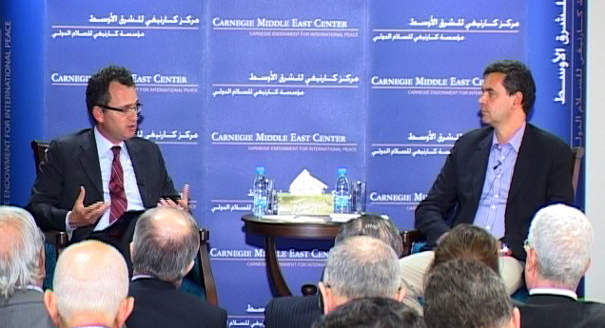Registration
Thank you!
You will receive an email confirming your registration.
The dramatic changes that have taken place in the Middle East as a result of the Arab Spring have propelled various Arab states into transition, and many are looking to Turkey as a model for the future.
Carnegie Europe’s Sinan Ülgen discussed his paper, From Inspiration to Aspiration: Turkey in the New Middle East, which addresses the relevance of the Turkish model for Arab states in transition. Carnegie Beirut’s Paul Salem moderated.
Turkey’s Domestic Example
- Economic Policy key to Electoral Success: As Islamist political groups have gained power in the new Middle East, Ülgen suggested that the simple slogan “Islam is the solution” will no longer serve as a sufficient political platform. Rather, he argued the success and longevity of Islamist parties in the Arab states will be determined by their competency in terms of economic policy. Looking at the Turkish model, Ülgen argued that the economic track record of the Justice and Development Party (AKP) is what gave them credibility and success at the polls.
- Elements of Economic Success: Turkey’s positive track record is a result of the separation of the state from the market and a shift toward a more export-oriented model, a process that began in the 1980s, Ülgen said. He added that Turkish success is also a result of the recognition that political stability is essential for economic prosperity. The rise of an entrepreneurial class also channeled funding for the creation of a vibrant civil society.
- The Kurdish Issue: Despite great economic success, Turkey has still been unable to solve its internal tensions with its Kurdish population. Until this issue is settled, it will remain an impediment to Turkey’s soft power in the region and may threaten domestic stability, Ülgen warned. He predicted that rather than developing a long-term solution, Turkey will continue to try to manage the Kurdish issue without addressing the problem in a comprehensive and fundamental way.
Turkey’s Foreign Policy
- Turkey’s New Foreign Policy: In the past, Turkish foreign policy could be summed up as, “Zero problems with neighbors.” With the onset of the Arab Spring, Turkey came to realize that this policy was unsustainable, Ülgen said. A desire to be on the right side of history has motivated Turkey to support the cause of pro-democracy movements in the Arab world. This shift will have repercussions for Turkey with respect to its relationship with its neighbors and also in terms of the regional balance of power, Ülgen added.
- Turkey’s Relationship with Syria: After having invested in its relationship with the Assad regime for many years, Turkey has dramatically changed course, Ülgen explained. After bitter disappointment with Assad, Turkey shifted its support to the Syrian opposition. Turkey’s options vis-a-vis Syria have become limited, and as a result of burning its bridges with the Damascus regime, Ankara has lost the possibility of being a broker in resolving the Syrian crisis.
- Turkey’s Relationship with Iran: Turkey’s shift in foreign policy is going to have enormous consequences for the bilateral relationship it has with Iran, Ülgen predicted. This relationship is complex and includes elements of both competition and cooperation. Ülgen argued that the long history of peace and stability between Turkey and Iran is not something that the leadership on either side would want to endanger. But today, both countries find themselves on opposite ends of the Syrian crisis. In addition, Iran’s nuclear program remains source of friction between the two countries, Ülgen added.
Recommendations for Arab States
Ülgen offered three recommendations for Arab states seeking to learn from the Turkish model:
- Foster an environment where the private sector can prosper. This requires the development of an independent business community and economic pragmatism.
- Separate the state from the economy.
- Allow the emergence of independent regulatory institutions, which can give assurances to both the private sector and international actors that there will be continuity and stability with respect to economic policies.
